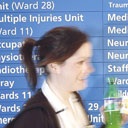
Gordon Brown was today warned to stop interfering with nurses' pay or face a national walkout by NHS staff as they pressed the case for a "substantial" pay increase.
Healthcare unions today issued a clear warning to the chancellor to stay out of the independent pay review process after evidence of Treasury meddling.
Both Beverly Malone of the Royal College of Nurses and Warren Town of the Society of Radiographers said they refused to "rule out" industrial action.
"It is a scandal, an absolute scandal, that the Treasury have sought to intervene in the independent process," said Karen Jennings of Unison.
The chancellor and heir apparent to the labour leadership provoked the ire of trade unions after it emerged that he had pressured the Department of Health to water down its submission on the level of pay that nurses should be awarded next year.
Nursing unions were furious after the government stalled on giving evidence for two weeks and suggested that nurses and other healthcare professionals should be awarded a pay rise worth only 1.5%.
Unions branded the government's claim that any rise above 1.5% would result in staff cuts to make ends meet as "blackmail".
The Department of Health's evidence was at odds with that submitted by NHS Employers, the pay and negotiating body which was supposed to handle the pay round on behalf of government and which recommended a 2% uplift in pay.
The health secretary, Patricia Hewitt, is believed to have fought for a bigger increase for NHS staff but was talked down by Mr Brown, who wants to see all healthcare workers receive an annual settlement of 1.5%, below the inflation rate of 3.6%.
The pay review body (PRB) is an independent body which gathers evidence from staff and employers before advising the government of the recommended pay increase for NHS staff.
Fourteen trade unions have argued in their own evidence for a substantial pay rise to reflect the cost of living and reward NHS staff in helping to achieve the government's ambitious agenda of reform in the health service.
Unions say that between 17,000 and almost 19,000 posts are under threat in the current financial crisis through vacancy freezes, closures and redundancies.
With a quarter of the nursing workforce due to retire in the next ten years, they claim that a fair and decent pay package is essential if the health service is to be able to recruit new blood and keep existing staff working in the profession.
Unions now seem convinced that Mr Brown will seek to undermine the PRB's independence and influence its final recommendation or pressure the health secretary to evade its implementation.
Unions point to the establishment of a new public sector pay committee set up at the behest of the Treasury earlier this year as evidence that Mr Brown is seeking to get a grip on the pay review process and undermine its independence.
The public sector pay committee or "pay gateway" is made up of ministers and civil servants and is charged with scrutinising all the evidence submitted to the PRB for the first time, as well as evaluating the independence of its final recommendation.
Beverly Malone, the general secretary of the Royal College of Nurses, the nursing union, warned the government to play by the rules and honour the PRB recommendation, due next March.
Industrial action could be on the cards if the government leant on the independent review body or failed to follow its final pay recommendation, she said.
"It is not the direction we would like to go but we would not rule it out," Dr Malone said.
Warren Town, the head of the Society of Radiographers, echoed her views. "We are very very clear that if the [PRB] offered a reward our members were willing to accept and the government interfered with it we would not rule out industrial action."
Karen Jennings, head of health at the largest healthcare union, Unison, pointed to the disparity between the NHS Employers' and the Department of Health's submission as evidence of Treasury meddling.
"It raises the question why there is a difference," Ms Jennings said.
"We can only surmise that the insulting and derisory offer [from the Department of Health] is the heavy boot of the Treasury. It is a scandal, an absolute scandal, that the Treasury have sought to intervene in the independent process."
The government was also derided over claims that any increase above 1.5% would result in a loss of frontline jobs.
"This is nothing less than blackmail," Ms Jennings added. "It is a clear attempt to threaten NHS staff over their own jobs. This will do little to improve morale or motivation of the workforce."

